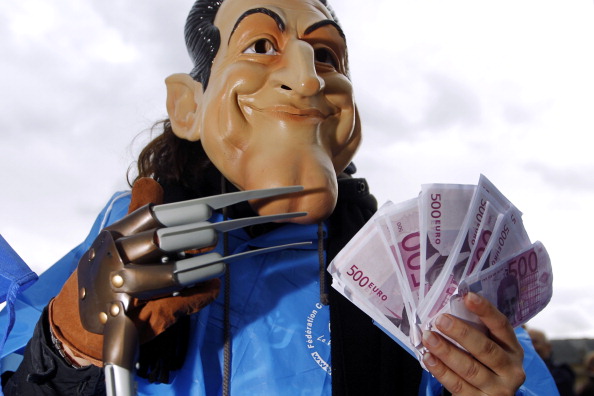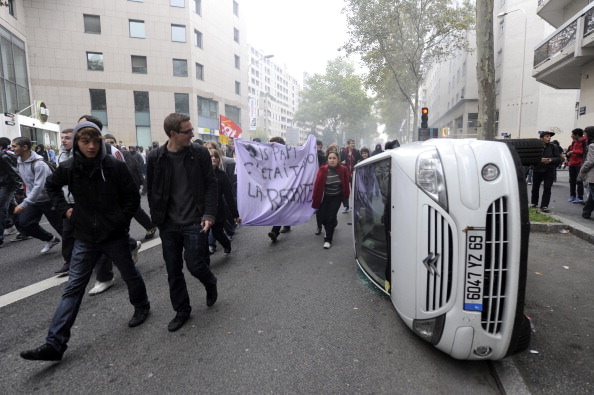It’s strike season in France. Nearly every year around this time you begin to hear the whistles and drums and the loudspeakers bleating out the chants: “On va gagner, on va gagner! OUAAI!!! OUAAI!!!” In a country obsessed with the loss of national memory and shared experience, the annual strikes are, along with the Tour de France, one remaining public ritual reminding the French that they are French—not “European,” not workers of the world united, but French. Les grèves begin as festive occasions. Kids cut class and workers get a paid day off, so long as the strike doesn’t last too long. The demonstrations I witnessed in Lyon last week—this time against government plans to raise the retirement age–reminded me of football Saturdays in Ann Arbor, where fans stroll to the stadium chanting “Let’s Go Blue!” and hang out at tailgate parties until kickoff. The Lyonnais seemed just as playful and even stopped once in a while to do the Wave. (La nouvelle vague?) At the end of the route the unions set up barbecues where they sold grilled merguez sausages—a fully assimilated culinary immigrant—and passed out shots of pastis to their comrades and winos from the quartier.
The strikes are largely empty rituals now—even if, as we’ve seen in recent days, they can descend into criminal street violence. The days when a small confrontation at the factories of Billancourt could bring out workers everywhere and paralyze the country are long over. The last time a national strike had a major effect was in 1995, when unions managed to block an earlier pension reform plan and prevent other benefit cutbacks proposed by then-Prime Minister Alain Juppé. But many of the changes proposed at the time have become reality in the intervening years and France has become, like most of its neighbors, a centrist nation. The Socialist Party remains divided à l’italienne among factions led by ambitious but ideologically nearly indistinguishable personalities—Ségolène Royal, François Hollande, Martine Aubry, and the slightly more centrist Dominique Strauss-Kahn—who would find it hard to govern together if they were brought back into power. Jean-Marie Le Pen’s National Front (NF) maintains its hold on a small, solid minority of the electorate on the right, politically untouchable but still able to affect the tenor of political debate. (President Nicolas Sarkozy’s recent decision to close illegal gypsy camps and expel their residents is widely seen as a bone tossed to potential FN voters.) In short, nothing moves.
More importantly, nothing seems to move. The strikes are ostensibly about a proposed change in pension policy that will raise the minimum age for a partial pension from 60 to 62, and a full pension from 65 to 67. (Yes, this is as crazy as it sounds.) But at a deeper level they are an expression of what the French call ras le bol: they’ve had enough. Enough unemployment, enough austerity, enough political paralysis, enough privileges for the well off, enough corruption. It’s an incoherent and sometimes self-contradictory set of worries, and taken together they don’t translate into any clear plan of action. But that doesn’t matter. Like Tea Party demonstrations in the US, they are the political equivalent of speech acts, provoked by economic contraction and loss of confidence in the political class.
It’s hard to know whether the European Union or the US will come out of the economic crisis stronger, given how differently they have responded to it. The Obama administration has chosen deficit spending in the hopes of creating jobs and triggering growth. The EU, thanks to Germany’s hard line, is leaning more on austerity measures, even at the risk of destabilizing member countries like Greece. One of these two approaches might work, or neither of them, but both have brought people into the streets. No matter what happens in the next couple of years, sitting governments will all be blamed for what they do and will find it hard to get themselves reelected.
But in France, a series of financial and political corruption scandals have further complicated things. At the beginning of October, so-called rogue trader Jérôme Kerviel was convicted for having run up nearly 5 billion euros in fictitious profits for his employers, the bank Société Générale—an amount he was symbolically ordered to repay the company, which has somehow managed to avoid responsibility in the whole affair. At about the same time it was announced that former president Jacques Chirac is to go on trial next year on a long-simmering charge of financing his party by paying phantom employees while he was mayor of Paris in the 1980s. The party, the center-right Union for a Popular Movement (UPM), which is also President Sarkozy’s, has already agreed to reimburse the city 1.7 million euros on his behalf. To make matters worse, it has also been rocked by plausible charges that a few years ago it was receiving bundles of cash for its campaigns from Liliane Bettencourt, the dotty L’Oréal heiress who in turn got a huge tax break from the government. (Bettencourt’s financial advisor was none other than the wife of then budget minister, Éric Woerth.)
Advertisement
The French do not tolerate corruption as much as their Italian counterparts do, but they do generally assume that in the worlds of politics and high finance ambition makes everyone dirty. What they cannot abide is the thought that the ambitious might also become rich. What particularly galls them about Sarkozy today is not that he is a Rastignac, but that he has become, as the title of a new book has it, Le président des riches. This probably has less to do with his actual policies, which are in line with those of other EU countries since the financial crisis, than with symbols—the Rolex, the Ray-Bans, his curvaceous wife Carla Bruni, and all the other bling bling that Italians love but the French on the right and left distrust. As a French writer quoted in the New York Times remarked, “He has a lifestyle that doesn’t look like that of everyone…this is a reaction against the elite.” That Sarko is the child of immigrants and never attended a grande école means that, even as the single most powerful man in France, he will always be seen as an arriviste. This snobbery goes hand in hand with deep suspicion of markets and capitalism among the middle and lower classes, which shows no sign of dying out even in the age of the global economy. In a recent international poll asking people what they thought was behind recent increases in food prices, respondents in most countries gave a mix of reasons—bad weather, government policies, market turbulence. Roughly half of the French pointed to unnamed “speculators.”
“Président des Riches” was scrawled on a great number of the signs I saw at the Lyon demonstrations, accompanied sometimes by a cartoon of the diminutive Sarkozy, dubbed Nicolas le Premier, in royal garb a few sizes too big. The biggest sensation along at the parade route was a rotund, rosy-cheeked working-class woman who had dressed herself up in a crudely sewn red-white-and-blue costume to look like Marianne, the mythical symbol of the French Revolution, complete with Phrygian cap. The woman had even made a little cap and robe for her black dachshund, who shivered and looked like he wished he could be anywhere else. She climbed up a lamppost to lead chants and show off her signs, one referring to the Bettencourt scandal, smiling for the cameras when asked to.
Watching her I wondered what really distinguished her from an American Tea Party activist in his Colonial Williamsburg faux-revolutionary outfit and three-cornered hat. After his rally at the Washington Mall our musket-bearing friend probably knelt down in prayer with fellow demonstrators, while she, I imagine, bellied up to the bar for a Pernod. But otherwise? They both feel cut out, distrust their leaders, want things to change, and don’t want anything to change. Above all they want to speak, and what comes to their lips is drawn straight from the national Id. Don’t tread on me! and On va gagner! turn out to mean exactly the same thing: we will be heard. Whether they have anything to say is another matter.
Postscript: In other news, the 250 members of the “Michael Jackson Community” of Montargis have registered officially as a “cultural association,” which under French law authorizes them to create a religion. According to their lawyer, this status gives the group “absolute freedom to pay homage to an important person, living or dead, on condition that they do not disturb the public peace.” “We are not a sect,” insists their president, Myriam Walter, “we just want a place to venerate him” She has in mind a plaque or statue, “pourquoi pas à Euro Disney.”




